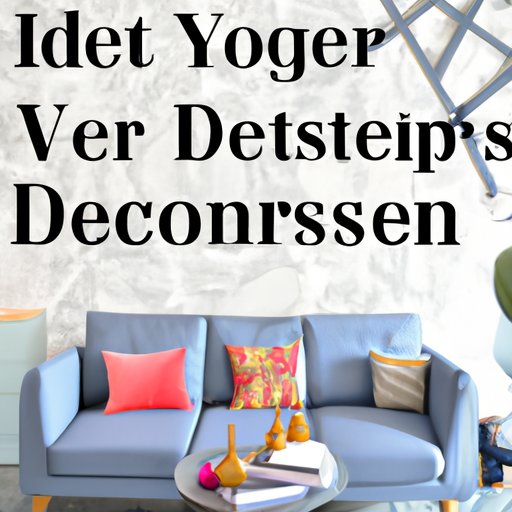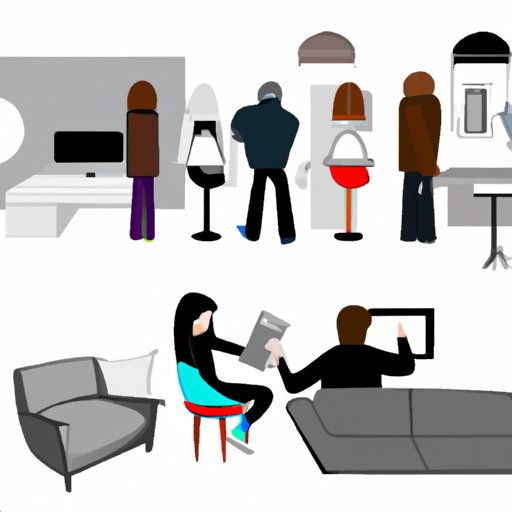Introduction
Interior design is a creative profession that focuses on the aesthetic and functional aspects of designing indoor environments. An interior designer is a professional who plans and executes the design of a space, considering the physical and psychological needs of the people who will use it. This article will explore what qualifications and skills are necessary to become an interior designer, as well as the educational requirements, types of jobs available, and tips for succeeding in the field.
Qualifications and Skills Needed to Become an Interior Designer
To be successful in the interior design industry, there are certain skills and qualifications that must be met. These include:
- Artistic Ability – A great eye for detail and an understanding of how elements such as colors, textures, and shapes can interact to create a pleasing environment.
- Knowledge of Color Theory – Knowing how colors work together and how they impact people psychologically is essential for creating balanced and harmonious spaces.
- Knowledge of Building Codes and Regulations – Understanding local building codes and regulations is important for ensuring that designs are safe and compliant.
- Understanding of Different Decorating Styles – Knowing how to incorporate different decorating styles into a design is key for creating a unique and custom look.
- Knowledge of Textiles, Furnishings, Accessories and Lighting – Knowing the best materials and products to use for a design is essential for creating beautiful and functional spaces.
What Education is Necessary to Pursue a Career in Interior Design?
In order to pursue a career in interior design, one must obtain a certain level of education. This can range from a bachelor’s degree to a master’s degree or even a certificate program. Each type of program offers its own unique benefits and learning opportunities.
- Bachelor’s Degree – A bachelor’s degree in interior design can provide students with a comprehensive education in the fundamentals of the profession, including design principles, drafting techniques, and computer-aided design (CAD).
- Master’s Degree – A master’s degree in interior design can provide more specialized knowledge and experience in areas such as lighting design, furniture selection, and project management.
- Certificate Programs – Certificate programs are ideal for those seeking a more focused education in interior design. These programs offer courses in topics such as residential design, commercial design, and kitchen and bath design.
What Kind of Training Do Interior Designers Need?
In addition to formal education, there are certain types of training that are necessary for becoming an interior designer. This includes:
- Practical Experience – Practical experience is essential for gaining real-world knowledge and insight into the profession. This can be gained through internships, volunteer work, or simply observing experienced professionals.
- Professional Certification – Becoming certified as an interior designer is a great way to demonstrate one’s commitment to the profession and showcase their expertise.
Exploring the Different Types of Interior Designers
There are many different types of interior designers, each specializing in their own particular area. Some of the most common types of interior designers include:
- Residential Designers – Residential designers specialize in creating aesthetically pleasing and functional living spaces for individuals and families.
- Commercial Designers – Commercial designers focus on creating spaces that are both visually appealing and conducive to productivity, such as offices and retail stores.
- Kitchen and Bath Designers – Kitchen and bath designers specialize in designing kitchens and bathrooms that are both stylish and functional.

The Benefits of Becoming an Interior Designer
Becoming an interior designer can be a rewarding and fulfilling career choice. Here are some of the benefits of pursuing a career in the field:
- Creative Expression – As an interior designer, you have the opportunity to express your creativity and bring your visions to life.
- Financial Rewards – According to the U.S. Bureau of Labor Statistics, the median salary for interior designers in 2019 was $53,370 per year.
- Flexibility – Many interior designers are self-employed and therefore have the freedom to set their own hours and work from home.

Tips for Succeeding as an Interior Designer
There are a few key steps to take when starting out as an interior designer. These include:
- Develop a Portfolio – Creating a portfolio of your best work is essential for showcasing your talents and attracting potential clients.
- Know Your Clients – Understanding the needs and wants of your clients is key for creating meaningful designs that meet their expectations.
- Market Yourself – Promoting yourself and your services is critical for getting noticed and building a successful business.

Networking Opportunities for Professional Interior Designers
Professional organizations, social media platforms, and local events are all great places to network and make valuable connections in the interior design industry. Here are some of the best places to start:
- Professional Organizations – Joining a professional organization, such as the American Society of Interior Designers (ASID) or the International Interior Design Association (IIDA), is a great way to meet other professionals and stay up-to-date on industry trends.
- Social Media Platforms – Social media platforms such as Instagram, Facebook, and Twitter are great ways to connect with potential clients and promote your work.
- Local Events – Attending local events, such as trade shows and conferences, is a great way to meet other professionals and find new job opportunities.
Conclusion
Becoming an interior designer is a rewarding and fulfilling career path. In order to succeed in the profession, one must possess certain qualifications and skills, obtain an appropriate level of education, and receive the proper training. Additionally, networking is essential for connecting with other professionals and finding job opportunities. With the right qualifications and dedication, anyone can pursue a career in interior design.
(Note: Is this article not meeting your expectations? Do you have knowledge or insights to share? Unlock new opportunities and expand your reach by joining our authors team. Click Registration to join us and share your expertise with our readers.)
